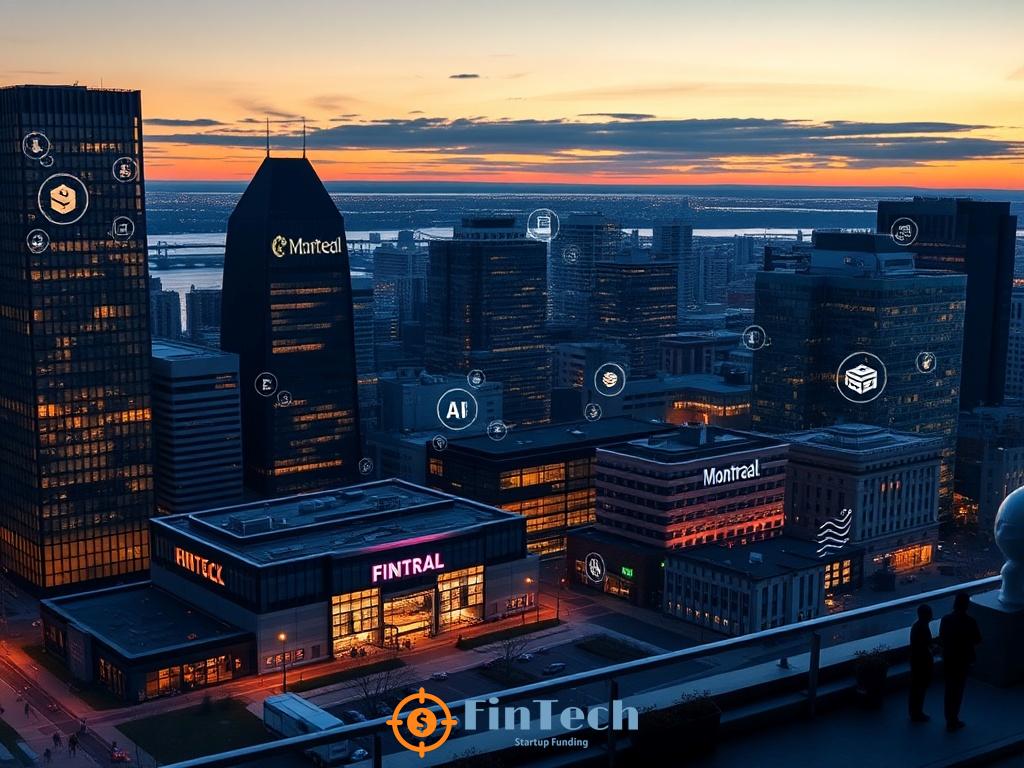Overview of Montreal’s FinTech Landscape

In recent years, Montreal has emerged as a significant player in the global FinTech landscape, driven by its robust technology ecosystem and a diverse pool of talent. The city is not just recognized for its vibrant culture and history, but also for its burgeoning FinTech sector powered by artificial intelligence. This convergence of finance and technology has attracted startups, established firms, and investors alike, creating a dynamic environment ripe for innovation.
Montreal’s FinTech scene is characterized by a variety of companies ranging from early-stage startups to established financial institutions. These players are leveraging AI and machine learning to create solutions that enhance customer experience, optimize operations, and mitigate risks. Notably, companies like Element AI, Flinks, and Koho are at the forefront, showcasing how technology can be harnessed to address contemporary challenges in finance.
| Company Name | Focus Area | Key Innovation |
|---|---|---|
| Element AI | AI Solutions | AI platform for financial services |
| Flinks | Data Aggregation | Secure financial data connections |
| Koho | Digital Banking | AI-driven budgeting tools |
The collaborative ecosystem in Montreal is a crucial factor contributing to the success of its FinTech sector. Initiatives like FinTech Canada and partnerships between academia and industry are fostering an environment of knowledge sharing and innovation. As the demand for AI-powered financial solutions continues to grow, Montreal is well-positioned to lead the charge, with its unique blend of technology and finance paving the way for a sustainable future in the FinTech arena.
Key Players in AI-Driven Financial Services

As Montreal solidifies its reputation as a hub for artificial intelligence in the financial sector, several key players have emerged, each contributing unique innovations that are reshaping the landscape of financial services. These organizations leverage advanced AI algorithms and cutting-edge technology to enhance efficiency, streamline processes, and offer personalized solutions to consumers and businesses alike. The following are some of the notable companies that are leading the charge in AI-driven financial services in Montreal:
- Element AI: Pioneering in AI solutions for financial services, Element AI provides businesses with tools to harness the power of artificial intelligence to tackle complex challenges. Their focus on building scalable AI capabilities positions them as a vital player in the ecosystem.
- Flinks: A leader in secure financial data aggregation, Flinks has developed a platform that allows for seamless connectivity between users’ financial accounts and applications, improving access to vital data while ensuring security and compliance.
- Koho: This digital banking platform is revolutionizing personal finance management with AI-driven budgeting tools that empower users to make informed financial decisions, thus enhancing overall user experience in banking.
- Hardbacon: With a focus on simplifying investment decisions, Hardbacon combines AI with a user-friendly interface to provide personalized financial advice and insights tailored to individual user profiles.
- Algoan: Specializing in risk management, Algoan utilizes AI to analyze financial data and predict consumer behavior, thereby helping lenders make more informed decisions.
These companies not only represent the forefront of innovation in Montreal’s FinTech scene but also illustrate the collaborative spirit of the city’s ecosystem. By fostering partnerships and sharing knowledge, they are collectively driving the adoption of AI in financial services, setting the stage for future advancements.
Regulatory Framework Supporting AI Innovation

In a rapidly evolving sector like FinTech, the intersection of artificial intelligence and regulatory frameworks is crucial for fostering innovation while ensuring consumer protection. Montreal’s unique approach to regulation in the realm of AI-powered financial services serves as a model for balancing innovation with accountability. As the city continues to attract talent and investment, understanding this regulatory landscape becomes paramount for stakeholders aiming to capitalize on AI advancements.
Frameworks Encouraging Growth One of the standout features of Montreal’s regulatory environment is its proactive stance towards embracing technology. Regulatory bodies, including the Autorité des marchés financiers (AMF), have established guidelines that not only aim to safeguard consumers but also encourage experimentation and the development of new technologies. Initiatives such as the Regulatory Sandbox allow FinTech startups to test their AI-driven solutions in a controlled environment, gaining valuable insights while ensuring compliance with existing laws.
Moreover, this framework is designed to keep pace with the rapid development of technology. The AMF has been actively involved in creating a dialogue with industry players, which facilitates a continuous feedback loop that allows for the adjustment of regulations as needed. This flexibility helps maintain a balance between fostering innovation and addressing potential risks associated with AI implementation in financial services.
Collaboration Between Public and Private Sectors The synergy between government bodies and private companies is another hallmark of Montreal’s approach to regulation. By promoting partnerships among startups, established firms, and regulatory authorities, the city is creating a collaborative ecosystem that thrives on shared knowledge and innovation. For instance, initiatives like the FinTech Cadence not only support the growth of startups but also involve regulatory discussions, ensuring that new entrants understand the compliance landscape from the outset.
This collaborative spirit is instrumental in promoting a culture of transparency and accountability. As AI technologies become more integrated into financial services, ensuring ethical standards and consumer trust will be vital. The regulatory framework in Montreal is designed to encourage responsible innovation, making it an attractive location for AI-driven FinTech companies.
| Key Regulatory Features | Impact on Innovation |
|---|---|
| Regulatory Sandbox | Allows for safe experimentation of new technologies in a controlled environment. |
| Continuous Engagement | Maintains a feedback loop between regulators and industry, adapting regulations as necessary. |
| Public-Private Partnerships | Fosters collaboration and shared knowledge, enhancing innovation and compliance understanding. |
In conclusion, Montreal’s regulatory framework is designed to support the rapid advancements in AI technology while ensuring that consumer protection remains a priority. As the city continues to cultivate its reputation as a leader in AI-powered FinTech, the interplay between regulation and innovation will be crucial in shaping a sustainable future for the industry.
Impact of AI on Investment Strategies
The integration of artificial intelligence within the investment landscape of Montreal is revolutionizing how investors approach asset management, portfolio diversification, and market analysis. As AI-driven tools become more prevalent, they significantly enhance the decision-making process, allowing investors to navigate the complex financial terrain with unprecedented agility.
The introduction of AI algorithms into investment strategies has altered the traditional analysis approach. Investors are now utilizing sophisticated machine learning models that can process vast datasets at remarkable speeds. These models analyze historical market trends, economic indicators, and even social media sentiments to predict future price movements. Such predictive capabilities enable investors to identify lucrative opportunities and react swiftly to market fluctuations, ultimately improving their portfolio performance.
Furthermore, AI is ushering in a new era of personalized investment strategies. By leveraging customer data, AI systems can tailor recommendations to meet individual risk appetites and investment goals. This shift towards personalization not only enhances user experience but also optimizes risk management. Investors can benefit from AI’s ability to simulate various market scenarios, assess potential risks, and adjust their strategies accordingly. The result is a more robust investment approach that aligns with both market conditions and personal financial objectives.
In summary, the impact of AI on investment strategies in Montreal is profound and multifaceted. As the city continues to be at the forefront of FinTech innovation, the synergy between advanced technology and investment practices is likely to redefine the financial industry landscape. Embracing these changes will be essential for investors looking to thrive in an increasingly competitive environment.
Future Trends in Montreal’s FinTech Sector
As Montreal continues to solidify its status as a leading hub for AI-driven financial services, the integration of emerging technologies is set to reshape the future of the FinTech sector. The advancements in AI algorithms, blockchain integration, and data analytics will play a pivotal role in enhancing operational efficiency and customer engagement. These innovations not only promise to streamline processes but also create a more secure and transparent financial ecosystem. With the rapid pace of technological evolution, stakeholders must remain proactive in adapting to these changes to harness their full potential.
In light of the growing reliance on AI in financial services, the emphasis on ethical AI practices is gaining traction in Montreal’s FinTech landscape. As organizations leverage machine learning and data-driven insights to enhance decision-making, the importance of ensuring fairness, accountability, and transparency in AI applications cannot be overstated. This shift towards ethical AI will not only foster consumer trust but also align with the regulatory frameworks that are increasingly prioritizing responsible innovation.
The following trends are anticipated to significantly influence the trajectory of Montreal’s FinTech ecosystem in the coming years:
- Decentralized Finance (DeFi): The rise of DeFi platforms will democratize access to financial services, enabling users to engage in lending, borrowing, and trading without traditional intermediaries.
- AI-Driven Personal Finance Tools: Personalized financial management applications, powered by AI, will offer tailored recommendations, helping users achieve their financial goals more effectively.
- Enhanced Cybersecurity Measures: As cyber threats become more sophisticated, the integration of AI in cybersecurity will be essential for protecting sensitive financial data.
- Collaboration between Financial Institutions and Startups: Increased partnerships will drive innovation, allowing incumbents to leverage the agility of startups while providing a robust infrastructure.
- Regulatory Adaptation to Emerging Technologies: Regulatory bodies will continuously evolve their frameworks to accommodate new technologies, fostering a secure and innovative environment for FinTech growth.
In conclusion, the future landscape of Montreal’s FinTech sector is poised for transformation, driven by technological advancements and a commitment to ethical practices. As the city embraces these trends, it will undoubtedly continue to lead the charge in AI-powered financial innovation.



